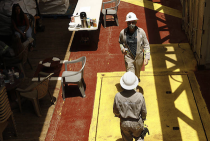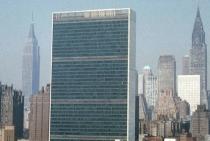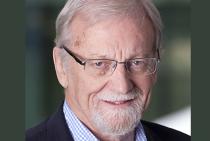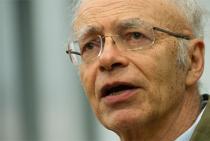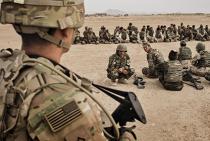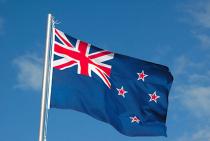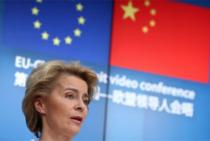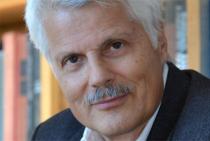Last month, US President Donald Trump banned or severely restricted nationals of 20 additional countries from entering the United States, expanding the entry restrictions he put in place in June, supposedly to mitigate “national security and public safety threats.” But a cursory glance at the list of targeted countries makes clear that this is just another case of ethnonationalist politics dressed up as an anti-terrorism measure. Many of the countries Trump targeted in 2025 – including ...Tonga... – have virtually no history of exporting transnational terrorism. -By Brahma Chellaney
You are here
Results for Op-Ed World Affairs
Saturday 3 January 2026
Geneva, Switzerland
Tuesday 28 October 2025
London, United Kingdom
Unless rescinded, Donald Trump’s executive order greenlighting deep-sea mining in direct violation of the UN Convention on the Law of the Sea will almost certainly unleash a lawless gold rush among major powers. Beyond the clear environmental risks, the scope for armed conflict is obvious. The first flash point will be the Clarion-Clipperton Zone, a six million km2 area in the Pacific with billions of tons of polymetallic nodules containing nickel, cobalt, and other valuable minerals at a depth of up to 4,000 meters. - Guy Standing
Saturday 4 October 2025
Stockholm, Sweden
While the demand for what the United Nations does is as great as ever, its ability to deliver has obviously been diminished. There is no way for it to survive without scaling back its ambitions and abilities, and that, in turn, may require a move to a more hospitable country. By any measure, the UN’s situation is dire.
Tuesday 17 June 2025
Melbourne, Australia
The “AUKUS” partnership, the 2021 deal whereby the United States and the United Kingdom agreed to provide Australia with at least eight nuclear-propelled submarines over the next three decades, has come under review by the US Defense Department. The prospect of its collapse has generated predictable handwringing among those who welcomed the deepening alliance, and especially among those interested in seeing Australia inject billions of dollars into underfunded, underperforming American and British naval shipyards. But in Australia, an AUKUS breakdown should be a cause for celebration. - Gareth Evans.
Saturday 24 May 2025
Cambridge-MA, USA
Power is the ability to get others to do what you want. That can be accomplished by coercion (“sticks”), payment (“carrots”), and attraction (“honey”). The first two methods are forms of hard power, whereas attraction is soft power. Soft power grows out of a country’s culture, its political values, and its foreign policies. In the short term, hard power usually trumps soft power. But over the long term, soft power often prevails. ...When you are attractive, you can economize on carrots and sticks. If allies see you as benign and trustworthy, they are more likely to be open to persuasion and follow your lead. ...But once trust is lost, it is not easily restored. By Joseph S. Nye, Jr.
Friday 16 May 2025
Cambridge-MA, USA
When you look at a building, you can see its walls, windows, and decorative flourishes but not the hidden structure that holds everything together. Yet during an earthquake, or after years of strain, that unseen framework can suddenly collapse. The same is true of the fragile political structures that support much of the developing world. By Ricardo Hausmann
Thursday 12 October 2023
Princeton, USA
Hamas’s brazen and vicious attacks within Israel have rightly drawn condemnation from around the world. If this is a war, as both sides agree it is, then Hamas’s deliberate targeting of civilians counts as a major war crime. But the brutality demonstrated by Hamas did not emerge in a vacuum. The lesson of what is currently happening in Israel and Gaza is that violence breeds more violence. The last real chance of avoiding the tragic conflict being waged between Israel and Hamas was destroyed by a single killing: the assassination of Israeli Prime Minister Yitzhak Rabin in 1995. The assassin was not a Palestinian militant, but an Israeli extremist opposed to the Oslo Accords for peace. The great beneficiaries of the assassination were Israeli nationalists, above all Binyamin Netanyahu.
Friday 9 June 2023
Melbourne, Australia
The International Institute for Strategic Studies’ Shangri-La Dialogue, Asia’s largest security conference, has wrapped up its 2023 meeting in Singapore. The context for this year’s summit was not propitious: Russia’s bloody invasion of Ukraine grinds on, while Chinese President Xi Jinping continues his uncompromising approach to global affairs. If one thing was obvious during the two days of defense diplomacy, it is that the Sino-American competition is far from being managed effectively. A robust bilateral dialogue is almost non-existent at the ministerial level, with military-to-military contact even more limited. Concluding the conference, Singaporean Defense Minister Ng Eng Hen once again warned about US-China tensions, a more militarized Indo-Pacific, and the risk of conflict. By Richard Maude
Saturday 28 August 2021
New York, USA
The magnitude of the United States’ failure in Afghanistan is breathtaking. It is not a failure of Democrats or Republicans, but an abiding failure of American political culture, reflected in US policymakers’ lack of interest in understanding different societies. And it is all too typical. Almost every modern US military intervention in the developing world has come to rot. It’s hard to think of an exception since the Korean War. By Jeffrey D. Sachs
Thursday 20 May 2021
NTU, Singapore
With the US-China strategic competition intensifying, New Zealand navigates these tricky geopolitical waters and pursues its ‘independent’ foreign policy even at the risk of offending its Five Eyes partners. ...It also takes into account critical views of its intelligence operations, especially among its close partners in the Pacific. New Zealand with its main signals facility on the South Island, is responsible for gathering information in the South Pacific. By Anne-Marie Schleich (RSIS).
Thursday 18 March 2021
London, United Kingdom
It is curious that presidents possess such unaccountable power at all. America’s founders rejected absolute monarchy and its trappings (such as noble titles), and yet the pardon power is descended from just such a monarchical power, the royal prerogative of mercy. Trump’s blatant violation of the original intent of the presidential pardon was just one of many challenges he posed to the political system established by the US Constitution. Johnson displays similarly worrying traits. Faced with such threats, courts and legislatures need to recall their true purpose: preventing the unchecked exercise of executive power. By Nicholas Reed Langen.
Monday 22 February 2021
Canberra, Australia
East Asia Forum: The United States abandoned economic leadership in Asia four years ago. Rather than promote and strengthen the multilateral institutions and frameworks that underpin Asia’s prosperity, the United States under President Trump began systematically undermining them: from the WTO, WHO and Paris Agreement, to military alliances with Japan and South Korea, bilateral trade ties and cooperation in regional forums. What can Biden do to instil confidence in a region still battered and bruised from four years of the Trump administration waywardness? - By the Crawford School of Public Policy, ANU.
Tuesday 12 January 2021
Boston-Mass, USA
Though mainstream observers were shocked that Donald Trump increased his support among many ethnic minority groups in the 2020 election, this should not have come as a surprise. The common thread linking the Trump base has little to do with demographics, and much more to do with a personality type. As president, Trump not only deployed racist, sexist, homophobic, xenophobic, and Islamophobic rhetoric, but actually baked it into his policies. So why does the 45th president appeal to so many voters whose ethnic, religious, and sexual identities he has mercilessly disparaged? Unless we improve our understanding of these voters’ overriding identification with those able and willing to exercise power, and their own latent thirst for power, we risk being blindsided by it again. By Yasheng Huang.
Tuesday 3 November 2020
Canberra, Australia
Whoever claims victory in the US presidential contest this week, Washington’s grasp over Asia’s future is on the wane. The world’s confidence in US power and the moral authority it once commanded and the capacity to deploy it are much diminished. Even the most energetic and driven administration won’t restore it easily, soon or perhaps ever. ...The reality is that small and middle powers in Asia now have to play an unfamiliar leadership role. This ominous responsibility will remain long after the 46th President of the United States settles into the White House. By East Asia Forum editors.
Tuesday 27 October 2020
London, United Kingdom
For those who have only ever known America as a champion of democracy and the rule of law, it has been tragic to witness the country's descent into corruption and bad-faith partisanship. And nowhere is the rule of "dark money" more evident than in the rushed confirmation of Amy Coney Barrett's appointment to the Supreme Court. By Chris Patten.
Monday 26 October 2020
Chicago, USA
Throughout US President Donald Trump's first term, there has been constant hand wringing over a "constitutional crisis" that never arrived. The irony is that an administration led by Joe Biden would almost certainly confront such a crisis, owing to Trump's transformation of the Supreme Court into a right-wing redoubt. A constitutional crisis, properly understood as a turning point that might lead to collapse or transformation of the system, has not occurred. But such a crisis does now appear increasingly likely. By Eric Posner.
Thursday 2 July 2020
Brussels, Belgium
On 22 June, the first summit took place between the new EU leadership team, headed by European Commission President Ursula von der Leyen and President of the European Council Charles Michel, and China’s President Xi Jinping and Premier Li Keqiang, but there was little time for small talk. One official remarked, ‘the gloves were off from the start’ with no attempt to secure a traditional joint statement, let alone a joint press conference. The EU side accepted that EU–China relations ‘were crucial in many areas’ but at the same time stated that ‘we have to recognise that we do not share the same values, political systems, or approach to multilateralism’. The Chinese side appeared surprised at these blunt words but they stemmed from the March 2019 EU policy document which stated that China was a ‘systemic rival’ in certain areas. By Fraser Cameron. East Asia Forum.
Tuesday 31 March 2020
Washington DC, USA
A pandemic is enveloping the world, endangering the lives and livelihoods of millions of people. As US President Donald Trump desperately seeks to shift blame for his own ineptitude, China is laying the groundwork for global leadership in the post-COVID-19 era. Thanks to Trump, the US will almost certainly lose the great-power competition – and countless lives. By Vali Nasr
Monday 6 January 2020
Washington DC, USA
Before US President Donald Trump decided to withdraw his country from the Joint Comprehensive Plan of Action (JCPOA) in May 2018, Javad Zarif, Iran’s foreign minister and the nuclear agreement’s chief Iranian architect, was the most popular public figure in his country. A year after the withdrawal, a University of Maryland poll shows, Zarif’s popularity was far surpassed by that of General Qassem Suleimani, the hardline Revolutionary Guard commander who was just assassinated in Baghdad on Trump’s order. Trump says he authorized the drone strike that killed Suleimani to “stop a war.” It is far more likely that he has started one – or at least the march toward one. By Djavad Salehi-Isfahani.
Monday 29 July 2019
New York, USA
How did the world’s two most venerable and influential democracies – the United Kingdom and the United States – end up with Donald Trump and Boris Johnson at the helm? Trump is not wrong to call Johnson the “Britain Trump” (sic). Nor is this merely a matter of similar personalities or styles: it is also a reflection of glaring flaws in the political institutions that enabled such men to win power. By Jeffrey D. Sachs.


